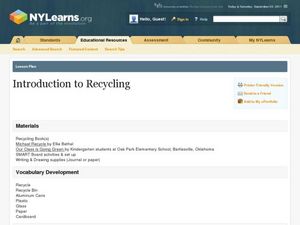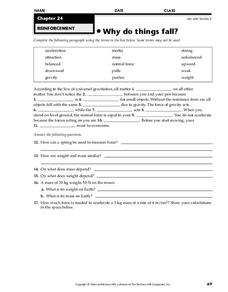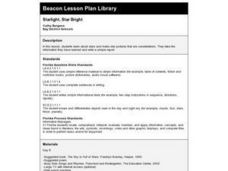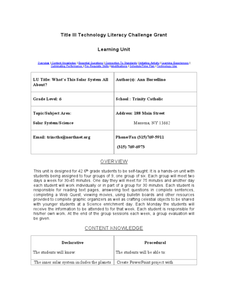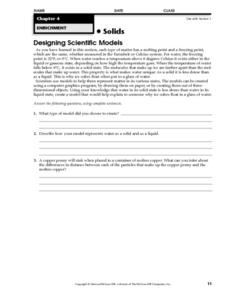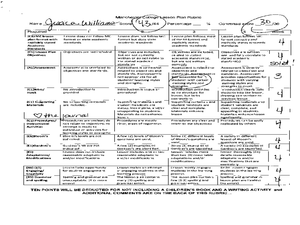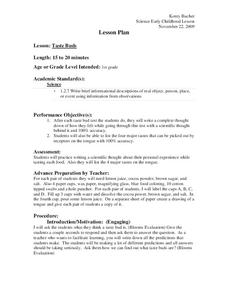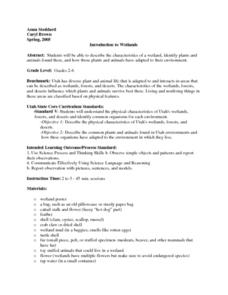Curated OER
Mystery of Mirrors: Discovery Stations
Hands-on stations in which groups of primary learners experience what mirrors can do provide opportunities for experimenting and authentic discovery. Recording their observations in complete sentences seems age-inappropriate. Drawing...
Curated OER
Changing Seasons
Explore expository writing and using precise language in this descriptive paragraph writing lesson. Learners brainstorm prior knowledge about the changing seasons in Ohio. They describe seasonal items, view seasonal pictures from...
Curated OER
Introduction to Recycling
Students read a story about recycling, and then identify 3 different objects that can be recycled on a worksheet of numerous items. In this recycling lesson plan, students also write a sentence about recycling.
Curated OER
Clouds
Second graders construct the 3 types of clouds using cotton balls and write sentences describing them. In this clouds lesson plan, 2nd graders describe a cumulus, stratus, and cirrus cloud.
Curated OER
Why Do Things Fall?
For this universal gravitation worksheet, middle schoolers fill in the blanks to complete sentences with 11 given terms about gravity, inertia, acceleration, mass and force. Students also answer 7 questions about mass, weight and force.
Curated OER
Energy from the Sun
In this energy from the sun worksheet, learners are given 20 terms to complete sentences about the sun, the energy of the sun, the radiation of the sun, the transfer of energy from the sun and the currents created by the energy of the sun.
Curated OER
Erosion Deposition Review
In this erosion deposition worksheet, students fill in 36 blanks to complete sentences about the formation of soil, the forces of erosion, physical and chemical weathering, sediments and soil deposition.
InqueryPhysics
Interpreting Motion Graphs
Every movement in the world can be measured and even motionless objects can be significant indicators of movement. Focus on motion graphs that feature distance vs. time, speed vs. time, and positive and negative acceleration.
Curated OER
Starlight, Star Bright
First graders read books and use the Internet to identify several constellations and stars in the night sky. They make star pictures and write a class report about the night sky including a title, complete sentences and a cited reference.
Curated OER
Bouncing Bubbles
Students complete a variety of activities exploring the joys and science of bubbles. They listen to the book "Bubbles Bubbles" by Mercer Mayer, create a bubble picture using Kid Pix, and explore blowing bubbles. Students experiment...
Curated OER
What's This Solar System All About?
Sixth graders complete a unit of lessons on the solar system. In small groups, they participate in a Webquest, watch movies, complete graphic organizers, and answer questions, create a model of the planets, and develop a Powerpoint...
Curated OER
To Float or Not to Float, That is the Question?
Ninth graders develop operational definition of density, do computations using density equation, categorize pieces of matter as being able to float on
water or not, based on density, explain why some objects sink or float based on...
Curated OER
Designing Scientific Models
In this scientific models worksheet, students will use a model to represent matter in its various states. Students can use a computer graphics program, drawing on paper, or three-dimensional creation. Then students will complete 3 short...
Curated OER
Our Five Senses Box
Young scholars discuss how their five senses help to identify objects. They select items from a mystery box and with their eyes closed they attempt to identify the object. They give answers in complete sentences.
Curated OER
Addendum to the Written Curriculum: Measuring Solids
Students use standard rulers to measure the length of common classroom items - such as pencils, books, desk tops - in inches and centimeters, and measure weight in pounds. They also answer math questions, such as "How long is the front...
Curated OER
Magnets
Students complete a series of experiments using magnets. In this physical science and magnetism lesson, students first predict and test the magnetic properties of various objects, then students determine if the size of a magnet impacts...
Curated OER
Review of the Five Senses
Students investigate the five senses. In this human biology lesson, students are given five items and identify which items match best with each of the senses. Students use objects such as a rock, hard candy, and a flower.
Curated OER
Observing and Writing about Butterflies
Students observe and write about butterflies. In this life cycle instructional activity, students listen to the story The Life of a Butterfly by Robin Bernard and watch a YouTube video of a butterfly coming out of his chrysalis....
Curated OER
Taste Buds
First graders taste a variety of items and record a full sentence about the way they taste. In this taste buds lesson, 1st graders predict and then taste various items. Students draw a picture of the tongue and show the part...
Curated OER
Before Pangaea, Rodinia
In this Pangaea and Rodinia activity, students complete 16 sentences about Wegener's theory of continental drift, the meaning of Pangaea, and why people rejected the theory of continental drift.
Curated OER
Introduction to Wetlands
Students describe the characteristics of a wetland, identify plants and animals found there, and how those plants and animals have adapted to their environment. They visit stations, view a video, and complete a KWL about the wetlands.
Curated OER
Should Recycling be Required?
For this recycling worksheet, students use 10 give terms to complete the sentences about trash, landfills, recycling and energy. They also answer 2 questions about trash collection fees and the economics of recycling.
Curated OER
Physical and Chemical Changes-Notes
In this physical and chemical change worksheet, students watch a movie called the "Brain POP" about property changes and fill in the blanks to complete 8 sentences which are examples of chemical and physical changes.
Curated OER
"Weather" or Not?
Students complete a three week unit about weather and how it affects our behavior. They read and discuss various books related to weather, conduct an experiment about the tilt of the earth, plan a field trip based on temperature,...


